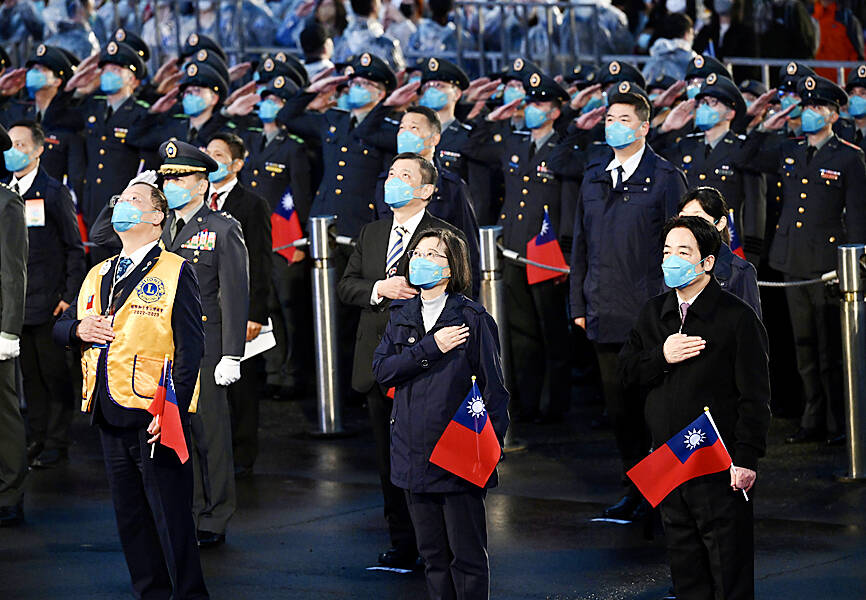Surplus national tax revenue is to be used to close financing gaps in the Labor Insurance and National Health Insurance funds, subsidize electricity prices and fund a series of initiatives to help weather potential dramatic changes in global economy this year, President Tsai Ing-wen (蔡英文) said in her New Year address at the Presidential Office in Taipei yesterday.
“We will consider sharing excess tax revenue with all citizens only when it is within our fiscal capacity to do so,” Tsai said.
Lawmakers from the Democratic Progressive Party and Chinese Nationalist Party (KMT) have urged the government to return the surplus tax revenue to the public.

Photo courtesy of the Association of Taipei Photojournalists
“I understand that some have proposed that excess tax revenue be equally shared among our people, which would surely make everybody happy,” Tsai said.
“However, as a responsible government, we need to plan ahead when the global economy is fraught with a high level of uncertainty,” she said. “We should prioritize the distribution of valuable resources to individuals and industries at risk to maintain the resilience of the country in times of crisis.”
“This is not an easy decision, but we must do it for our country. We hope that people understand and support this decision,” she added.
The Ministry of Finance estimated that last year’s national tax revenue is expected to exceed the budget by NT$450 billion (US$14.65 million), of which NT$70 billion is to be used to fund the operations of local governments, Tsai said.
Of the remaining NT$380 billion in tax revenue, NT$100 billion is to be allocated to electricity price subsidies and closing the funding gap in the Labor Insurance and National Health Insurance funds, she said.
Another NT$100 billion is to be used to fund government initiatives to withstand potential global economic changes this year, she said.
The initiatives include increasing the housing supply and offering subsidies for renters and those who are on home loans; subsidizing public transport commuters; subsidizing families who are in the middle and low-income range; reinforcing agricultural and fishery infrastructure; attracting 6 million international tourists this year; sustaining stable prices of food and daily necessities; and helping upgrade small and medium-sized industries nationwide, she said, citing decisions made at a National Security Council meeting on Saturday.
Whether this means the government is unlikely to distribute cash or vouchers using the remaining surplus tax revenue as it did in 2020 and last year, Tsai said that closing the financing gap of the Labor Insurance Fund and maintaining stable retail prices are also ways to return tax revenue to the public.
The global economy is likely to be worse than expected this year, and there remains a high level of uncertainty, she said.
“The rest of the tax revenue — NT$180 billion — could enable us to fund subsequent economic stimulus plans. We need to use the money cautiously in case emergency situations occur,” she said.
Tsai said the Presidential Office and the Executive Yuan are together consulting the private sector on the development of six core strategic industries: national defense, war readiness, precision healthcare, renewable energy, cybersecurity, and semiconductor and information technology.
Stability of the Indo-Pacific region is also threatened, she said.
A plan she introduced last week to bolster national defense would enhance Taiwan’s defense through a comprehensive adjustment of the defense systems and by raising the quality and quantity of military training for conscripts, she said.

Beijing could eventually see a full amphibious invasion of Taiwan as the only "prudent" way to bring about unification, the US Department of Defense said in a newly released annual report to Congress. The Pentagon's "Annual Report to Congress: Military and Security Developments Involving the People's Republic of China 2025," was in many ways similar to last year’s report but reorganized the analysis of the options China has to take over Taiwan. Generally, according to the report, Chinese leaders view the People's Liberation Army's (PLA) capabilities for a Taiwan campaign as improving, but they remain uncertain about its readiness to successfully seize

Taiwan is getting a day off on Christmas for the first time in 25 years. The change comes after opposition parties passed a law earlier this year to add or restore five public holidays, including Constitution Day, which falls on today, Dec. 25. The day marks the 1947 adoption of the constitution of the Republic of China, as the government in Taipei is formally known. Back then the Chinese Nationalist Party (KMT) governed China from Nanjing. When the KMT, now an opposition party in Taiwan, passed the legislation on holidays, it said that they would help “commemorate the history of national development.” That

Trips for more than 100,000 international and domestic air travelers could be disrupted as China launches a military exercise around Taiwan today, Taiwan’s Civil Aviation Administration (CAA) said yesterday. The exercise could affect nearly 900 flights scheduled to enter the Taipei Flight Information Region (FIR) during the exercise window, it added. A notice issued by the Chinese Civil Aviation Administration showed there would be seven temporary zones around the Taiwan Strait which would be used for live-fire exercises, lasting from 8am to 6pm today. All aircraft are prohibited from entering during exercise, it says. Taipei FIR has 14 international air routes and

Snow fell on Yushan (Jade Mountain, 玉山) yesterday morning as a continental cold air mass sent temperatures below freezing on Taiwan’s tallest peak, the Central Weather Administration (CWA) said. Snowflakes were seen on Yushan’s north peak from 6:28am to 6:38am, but they did not fully cover the ground and no accumulation was recorded, the CWA said. As of 7:42am, the lowest temperature recorded across Taiwan was minus-5.5°C at Yushan’s Fengkou observatory and minus-4.7°C at the Yushan observatory, CWA data showed. On Hehuanshan (合歡山) in Nantou County, a low of 1.3°C was recorded at 6:39pm, when ice pellets fell at Songsyue Lodge (松雪樓), a